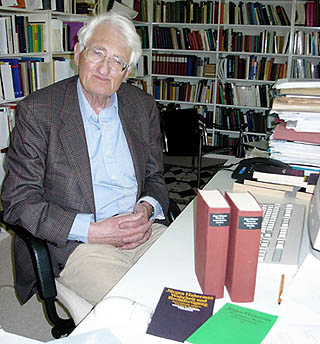Philosopher Juergen Habermas wins the prestigiously-funded Kyoto Prize
Kyoto Prize 2004
11 June 2004
The German philosopher Juergen Habermas (75) has received this year’s Kyoto Prize for his life’s work.
Juergen Habermas is one of the most influential philosophers and prominent thinkers
of social policy. The Emeritus Professor of the University of Frankfurt has also been awarded the Peace Prize of the German Book Retailers’ Society (2001) and the Premio Príncipe de Asturias (2003). His scientific work focuses for example on the structure of society, communication theories and research into living conditions in a scientific and technical world. After the indologist Paul Thieme, Habermas, who was born in Duesseldorf, is the second German citizen to win the Kyoto Prize.
The American computer expert Alan Curtis Kay is a pioneer in the field of information technology. He was the first to draft the concept of a personal computer back in the 1960s, and also played a key role in the development of this idea. The co-founder of the Californian Xerox Palo Alto research centre was involved in the establishment of the ARPANet, a precursor to the Internet used by the American military. He developed computer networks and pushed ahead the development of the Windows system’s overlapping windows, object-orientated programming and desktop publishing. His career has included posts at Atari, Apple Computer and Hewlett-Packard. Kay has also received the “Zero-One Award” (development of new media) from the Berlin University of Arts, the “Software Systems Award” (in 1987) and the “Turing Award” (in 2003) from the Association for Computing Machinery.
The work of biochemist and human geneticist Alfred George Knudson has played a key role in modern cancer research and has helped towards the understanding of how cancer cells are formed. One area of focus is the “Two-Hit Model” developed by Knudson, which describes the ways in which sporadic and hereditary tumours are created. According to this model, two successive cell mutations are required for the development of a tumour. The scientist received the renowned Albert Lasker Award, one of the most coveted prizes in medicine, in 1998. Since 1976, he has been Professor of Paediatrics and Human Genetics at the University of Pennsylvania and a member of the Fox Chase Cancer Center.
With this year’s Kyoto Prize, artists and scientists who have given of their services to develop the sciences and the arts were honoured for what is now the 20th time. The prize was created in 1984 by Kazuo Inamori, the founder of the Japanese technology group Kyocera, and is awarded each year by the foundation he also created.


